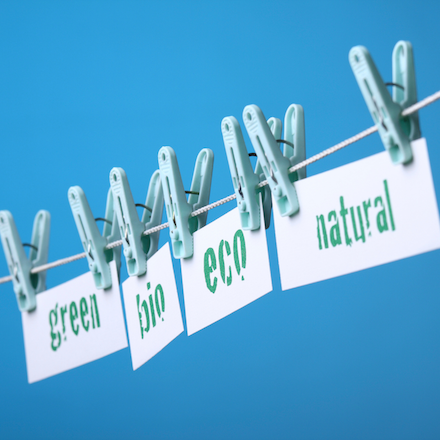
These days it can be difficult to know what products are truly ‘green.’
The increase in conscious consumerism has encouraged brands to hop on the sustainability bandwagon, making use of vaguely ‘eco’ sounding words as a marketing ploy.
Alongside checking how much information a brand really discloses about a product, and delving deeper into the materials used, you can look out for some of the buzzwords commonly used.
These buzzwords tend to be unregulated terms, for example, in the cosmetics industry the term ‘cruelty free’ can be used, well freely, because according to the FDA (Food and Drug Administration) ‘there are no legal definitions for these terms.’ (FDA.gov) The same applies for products marketed as ‘Earth friendly.’

So, want to know if you’re being green-washed? Check out our guide to green-washing buzzwords below:
Certified Green: There is no such thing as a ‘green’ certification when it comes to product. According to the Cambridge Dictionary, a green certification is a system of checking buildings to see that they are built and operate in a way that protects the natural environment. So, unless you’re looking at real estate, that ‘green’ certification could be pretty much any colour.
Environmentally / Eco Friendly: There is no measure to check if a product is environmentally friendly or not, so a company can state this without any fear of legal trouble. Ultimately this term is meaningless.
All Natural / Natural: Similarly, to the above, there is no standard for whether a product is truly natural. You can stick a piece of bamboo on a product and call it natural.
Non-toxic: The phrase ‘non-toxic’ is another marketing tool. All it means is that the product does not contain ingredients linked to toxic responses in humans, like cancer for example.
Chemical-free: This is physically impossible. Everything is a chemical because everything is made up of matter.
Eco/Bio: The noun ‘eco’ has no real meaning, it’s short for ecology, meaning related to the environment. The same applies for bio.

While all of this may seem pretty daunting, there are legitimate certifications that are worthwhile looking for and you can be reassured by. Some of them are:
FSC Certified: If a product is labelled ‘FSC Certified’ it means that the wood used in the product and the manufacturer that produced the product met the requirements of the Forest Stewardship Council.
TRUE: The TRUE Zero Waste certification system recognises businesses that are working toward achieving zero waste, cutting their carbon footprint, and supporting public health. To be certified, companies must have a zero-waste policy in place and must have achieved an average of 90% or higher in diverting non-hazardous waste from landfills, incinerations, and the environment for the past year.
Global Organic Textile Standard: GOTS is recognised as the world’s leading processing standard for textiles made from organic fibres. To be certified you must meet a high-level environmental criterion along the organic textiles supply chain, along with the social criteria.
B Corp™️ Certified: Certified B Corporations are businesses that meet the highest standards of verified social and environmental performance, public transparency, and legal accountability to balance profit and purpose.
SMETA accreditation: SMETA (Sedex Members Ethical Trade Audit) is designed to help auditors conduct high quality audits that encompass all aspects of responsible business practice. The accreditation involves the assessment of a site based on their organisation’s standards of labour, health and safety, environment, and business ethics.
The Business Social Compliance Initiative: The BSCI is an industry-driven movement that aims to monitor and assess workplace standards across the global supply chain. The audit helps a business to monitor its supply chain to ensure that all suppliers are treating workers ethically and legally.





